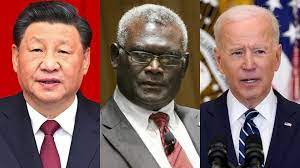The Pacific looks set benefit economically, but some countries could also face “danger” to their democracies, after China’s president cemented his grip on the country’s leadership.
As widely anticipated, Xi Jinping was elected as general secretary of the Chinese Communist Party on Sunday, his third term in that role, which will also likely see him elected as China’s president in March.
The Pacific region has become a battleground for the intensifying power struggle between the U.S and China and as result of Xi’s re-election, that situation looks set to escalate.
Former Chinese diplomat Han Yang said under Xi’s leadership, China’s foreign policy will continue to be “aggressive and assertive” as the president sees this time as an “opportunity for China’s national rejuvenation”.
“China’s overall strategic foreign policy initiative [is to] establish themselves as a global power, so they want to establish the so-called ‘global south’ as a counterpoint to the leadership of the U.S among the West,” Han told the ABC’s Pacific Beat.
“As for the Pacific, it will actually benefit from that competition between China and the U.S.”
Han highlighted the example of the Solomon Islands, where Prime Minister Manasseh Sogavare has sought to leverage the country’s relationship with China and the U.S “to gain maximum political and economic benefit”.
“The Solomon Islands PM is only doing what he thinks is in the best interest of his country … where both China and the U.S [are] trying to gain the upper hand strategically in the Pacific,” he said.
At the same time, Han said there are also risks for Pacific countries when it comes to interacting with China because it is “not a democratic country”.
“A lot of the transactions China has conducted, including their aid programs to the Pacific, are not as transparent as we would have hoped,” Han said.
“[These transactions] likely will involve some underhanded dealings and that certainly [presents] danger to the democratic development of those countries. In that regard, we should be concerned.”
In stressing China’s “great rejuvenation” during the CCP’s national congress meeting last week, Xi Jinping said this could not be achieved until China reached “full reunification” — which includes seizing control of Taiwan.
This means China would again mount pressure on Pacific countries to reconsider their diplomatic ties, said the Lowy Institute’s Alexandre Dayant.
“Taiwan is a big issue for China as Taiwan has the most diplomatic allies in the Pacific,” he said.
In 2019, Kiribati took everyone by surprise when, just days after Solomon Islands, they ditched Taiwan for China, ending 36 years of diplomatic relations.
Palau, Nauru, Tuvalu and Marshall Islands still maintain diplomatic ties with Taiwan.
But Dayant believes Tuvalu could be persuaded to switch it’s allegiance to China.
“Tuvalu has a very strong relationship with Taiwan, but it could be the weak link if China pushes for more diplomatic allies in the Pacific, and it could be done through climate resilience projects,” he said.
The battle between China and the US for influence in the Pacific has already been escalating this year.
In September, the U.S secured a historic joint partnership declaration with all 14 Pacific island nations, after a bid by China to secure a similar agreement failed.
Australia has also been seeking to counter China’s influence.
The federal government is set to further boost foreign aid to the Pacific in Tuesday’s budget, promising to lift development spending by almost $1.4 billion(US$883 million) during the next four years.
Joanne Wallis, a professor of International Security at the University of Adelaide, said increased spending was “not the only answer” for Australia to improve relationships in the Pacific, and “a lot will depend on how the increased funding is spent”.
“So far, the ALP government has struck a positive tone in their public statements about the Pacific and indicated a willingness to listen and respond to the Pacific,” Professor Wallis said.
“Hopefully that approach carries over into how they target their increased spending.”
The funding commitment comes after Australia and Fiji made a deal to increase defence cooperation and talks are underway for a Papua New Guinea-Australia security treaty.
“Australia had been pursuing security agreements with Pacific Island countries well before China tried to do the same,” said Professor Wallis.
It is also likely that China will pursue more bilateral security agreements but it is “difficult to see another Pacific island country agreeing to one”, she said.
“The only realistic potential candidate is Kiribati, which, like Solomon Islands, switched diplomatic recognition to China in 2019, is currently outside the Pacific Islands Forum, and did not participate in the U.S-Pacific Islands Summit in September.”
While much of the power struggle unfolds in security deals inked by high-level leaders, some Pacific Islanders have welcomed the opportunities it has created for them.
Setope So’oa’emalelagi teaches Samoan language and culture to students at the Beijing Foreign Studies University (BFSU) in China.
His job came about through Beijing’s push for Pacific Island language courses to be taught in China as part of the Belt and Road initiative.
So’oa’emalelagi said he would like to see education programmes like this one expanded.
With a class of 50 students each term, of whom about “96 percent are Chinese students”, So’oa’emalelagi said the course was bridging knowledge gaps for both Chinese and Samoans.
It also offered Pacific scholars the chance to travel to China to learn about the country, its people, culture and politics — and was a place with deep ties to the Pacific.
“Chinese people in Samoa go back to the 1850’s as indentured labourers,” he said.
“A big proportion of Samoans are Chinese, and waves of Chinese-Samoans have kept close connections with China.
“This gives some students an angle to understanding China that is not only through the west – these geopolitical issues will not be understood unless you travel there to learn and live,” he said.
SOURCE: ABC PACIFIC/PACNEWS













